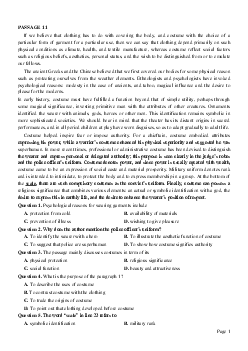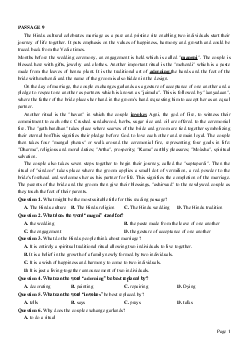



Preview text:
PASSAGE 10
What do you do if your cellphone rings while you are with a group of people? If you are French, you
will probably ignore the call. If you are English, you may walk away from the group to answer it. If you
are Spanish, you are likely to answer it there in the middle of the group and invite everyone around you to
join the conversation. As many travelers have noticed, there are considerable differences from one
country to another in the way people use their cell phones. This has been confirmed by a recent study of
cell phone use in three European cities - Madrid, London, and Paris.
According to Amparo Lasén, the Spanish sociologist who conducted the study, there were no real
surprises for anyone who is familiar with the customs in these cities. Lasén interviewed people and
observed their behavior in three different settings: a major train station, a commercial area, and a business
district in each city. She found that Londoners use their cell phones the least in public. If they are with
others, they prefer to let calls be answered by voice mail (a recorded message) and then they check for
messages later. If the English do answer a call on the street, they seem to dislike talking with others
around. They tend to move away from a crowded sidewalk and seek out a place where they cannot be
heard, such as the far side of a subway entrance or even the edge of a street. They seem to feel that the
danger of the traffic is preferable to the risk of having their conversation be overheard. This has led to a
behavior that Laser) has called "clustering." At a busy time of day on the streets of London, you may find
small crowds of cell phone users grouped together, each one talking into a cell phone. Even when it is
raining-as it often is in London-people still prefer not to hold their conversations where others could hear.
They talk under their umbrellas or in a doorway.
In Madrid, on the other hand, few people use voice mail because the Spanish dislike talking with
machines rather than real voices. If there is no answer, they don't leave a message. They prefer to try
again later or wait for a return call. And since the Spanish are not shy about answering their calls in
public, the call may come sooner than it would in London or Paris. In fact, in Madrid it is common to hear
loud and lively phone conversations on the street, accompanied by shouts, laughter and the waving of
hands. In fact, sometimes it happens that a group of friends may be walking down the street together, each
talking on their own phone, but smiling and nodding as though it were one large conversation that
everyone could hear. Even when they are not using their phones, the Spanish often hold them in their
hands as they walk down the street or put them on the table at a restaurant, so they will not miss any
incoming calls. In a movie theater, not only do cell phones occasionally ring, but people sometimes
answer them and have brief conversations.
In Paris, however, there are stricter rules about how and when to use cell phones. It is not considered
polite to use a phone in a restaurant, for instance, though it might be acceptable in the more informal
setting of a café. One special custom that has developed in cafés seems unique to Paris. Young women
often place their cell phones on the table beside them to signal that they are expecting someone. When the
friend arrives, the phone is put away. In fact, the French are generally very disapproving of phone use in
public and are quick to express that disapproval, even to strangers.
Question 1. What is the main idea of the passage?
A. People in Europe use mobile phones differently.
B. The use of mobile phone differs across cultures.
C. The Spanish talk loudly on the phone.
D. The way people talk on the phone depends on where they are. Page 1
Question 2. What does the word "ignore" in line 2 of the first paragraph mean?
A. pretend not to hear B. Notice C. stop to talk D. refuse to meet
Question 3. How many places was the study conducted in? A. 1 B. 2 C. 3 D. 4
Question 4. What is the purpose of the study?
A. To find out if people in different cities use phones differently.
B. To see who use voicemail more often.
C. To see if phones are used differently in towns and villages.
D. To see you use phones more often in public places.
Question 5. When an English person wants to answer a phone call, what does he do?
A. He checks if the number is familiar.
B. He checks for messages later.
C. He steps away from a crowd.
D. He dislikes other people.
Question 6. Why do the Spanish dislike voicemail?
A. Because they like reading messages.
B. Because they are too lazy to leave a voicemail.
C. Because they prefer to talk to a person.
D. Because voicemail is expensive.
Question 7. In Paris, if a woman puts her phone on a table in a restaurant, what is the message?
A. She is waiting for someone. B. She is very polite.
C. She is not ready to orderyet.
D. She will stay until she takes the phone away.
Question 8. What can we infer about the French?
A. They have strict social rules about the use of phones in public.
B. They can be very impolite to strangers.
C. The disapprove the use of mobile phones.
D. They encourage the use of mobile phones in public places. ĐÁP ÁN 1-D 2-A 3-C 4-A 5-C 6-C 7-A 8-A
LỜI GIẢI CHI TIẾT Question 1:
Dịch nghĩa : Ý chính của bài văn là :
A. Người Châu Âu dùng điện thoại theo những cách khác nhau
B. Ứng dụng điện thoại khác nhau tuỳ theo văn hoá
C. Người TBN nói to trên điện thoại
D. Cách mọi người nói chuyện trên đt tuỳ thuộc vào vị trí của họ Question 2:
Giải thích : to ignore a phone call = to pretend not to hear (the ring) Question 3:
Giải thích : Nghiên cứu thực hiện ở 3 nơi : London, Madrid và Paris Page 2 Question 4:
Đáp án A. To find out if people in different cities use phones differently. Dịch nghĩa : Mục đích của nghiên cứu :
A. Tim hiểu liệu người ở những vùng khác nhau có dùng điện thoại khác nhau không
B. Để xem ai dùng ghi âm thoại nhiều hơn
C. Để xem nếu đt được dùng khác nhau ở thành thị và nông thôn
D. Để xem bạn dùng đt nhiều hơn ở nơi công cộng Question 5:
Đáp án C. He steps away from a crowd.
Dịch nghĩa : Khi 1 người Anh muốn nghe đt, anh ta sẽ :
A. Kiểm tra xem số gọi đến có quen không
B. Kiểm tra xem tin nhắn thoại sau đó C. Rời khỏi đám đông
D. Không thích người khác Question 6:
Đáp án C. Because they prefer to talk to a person.
Dịch nghĩa : Tại sao người TBN không thích ghi âm thoại ?
A. Vì họ thích đọc tin nhắn
B. Vì họ nhác phải để lại ghi âm thoại
C. Vì họ thích nói chuyện với người thực hơn
D. Vì ghi âm thoại tốn kém Question 7:
Đáp án A. She is waiting for someone.
Dịch nghĩa : Ở Paris, nếu 1 phụ nữa đặt đt trên bàn ăn nhà hang, cô ấy có ý gì ?
A. Cô ấy đang đợi 1 ai đó B. Cô ấy rất lịch sự
C. Cô ấy chưa sẵn sàng gọi món
D. Cô ấy sẽ ở lại đến khi cất đt đi Question 8:
Đáp án A. They have strict social rules about the use of phones in public. Dịch nghĩa : Có thể suy ra điều gì từ người Pháp ?
A. Họ có những luật lệ XH nghiêm khắc về việc dùng đt nơi công cộng
B. Họ có thể rất lịch sự với người lạ
C. Họ không đồng tình việc dùng đt
D. Họ khuyến khích dùng đt nơi công cộng Dịch bài
Bạn sẽ làm gì nếu điện thoại di động reo lên khi bạn đang ở với 1 nhóm người ? Nếu là người
Pháp, có thể bạn sẽ phớt lờ cuộc gọi đó. Nếu là người Anh, bạn có thể sẽ rời khỏi nhóm người và trả lời
điện thoại. Nếu là người Tây Ban Nha, bạn có thể sẽ trả lời cuộc gọi ngay giữa nhóm người và mời mọi Page 3
người xung quanh cùng tham gia vào cuộc gọi. Như nhiều người thường di chuyển chú ý, có một sự khác
biệt đáng kể giữa đất nước này và đất nước kia về cách mà họ dùng di động. Đây là điều được khẳng định
bởi 1 nghiên cứu gần đây về di động ở 3 thành phổ Châu Âu – Madrid, London và Paris.
Theo Amparo Lasén, nhà xã hội học TBN người tiến hành nghiên cứu, không có sự ngạc nhiên
thật sự nào đối với những người quen với phong tục ở những thành phố này. Lasén phỏng vấn nhiều
người và quan sát hành xử của họ trong 3 mô hình thiết lập khác nhau : trên 1 bến đỗ tàu lớn, 1 khu
thương mại, và 1 quận kinh doanh ở mỗi thành phố. Cô ấy phát hiện ra người London dùng di động ít
nhất trước đám đông. Nếu đang ở với người khác, họ sẽ để cuộc gọi được tự động trả lời bởi lời thoại ghi
âm và sau đó kiểm tra tin nhắn. Nếu người Anh trả lời cuộc gọi ngay trên phố, họ có vẻ không muốn nói
chuyện với mọi người xung quanh. Họ có khuynh hướng di chuyển khỏi dòng người và tìm một nơi họ
không bị nghe thấy, như khu vực rất xa cửa vào tàu điện ngầm hoặc thậm chí là góc phố. Họ có vẻ cảm
thấy sự nguy hiểm của dòng xe cộ tốt hơn là để cho cuộc gọi của mình bị nghe thấy. Điều này dẫn đến 1
lối ứng xử mà Lasẻ gọi là “clustering”. Ở thời điểm bận rộn trong ngày trên những con đường London,
bạn có thể bắt gặp những đám đông nhỏ những người dùng di động đi cùng nhau, mỗi người nói vào điện
thoại. Ngay cả khi trời đang mua - thường là vậy ở London - người ta vẫn không muốn cuộc thoại của
mình bị nghe thấy. Họ nói chuyện dưới ô, hoặc trên xe điện ngầm.
Trái lại, ở Madrid, ít người dùng thư thoại vì người TBN không thích nói chuyện với máy móc
thay vì là giọng người thật. Nếu không có ai trả lời, họ không để lại tin nhắn. Họ thích gọi lại sau đó hoặc
đợi người kia gọi lại cho mình hơn. Và vì người TBN không e ngại việc trả lời điện thoại ở chốn đông
người, cuộc gọi có thể đến sớm hơn nó có thể nếu là ở London hay ở Paris. Thực tế, ở Madrid, sẽ bình
thường nếu nghe những cuộc họi thoại lớn và sống động ở trên phố, kèm theo tiếng la hết, cười và vẫy
tay. Thực tế, thỉnh thoảng 1 nhóm bạn có thể đi xuống phố cùng nhau, mỗi người nghe 1 chiếc điện thoại,
nhưng cười và gật đầu thể như họ đang ở trong 1 cuộc hội thoại lớn mà mỗi người đều nghe thấy. Ngay
cả khi không dùng điện thoại, người TBN thường cầm chúng trong tay khi bước xuống phố hoặc để
chúng trên bàn ăn, để không nhỡ 1 cuộc gọi đến nào. Trong rạp chiếu phim, không những di động thỉnh
thoảng reo, mà người ta thường tả lời chúng và có 1 đoạn hội thoại ngắn.
Tuy vậy, ở Paris, có những luật lệ nghiêm khắc về việc dùng điện thoại lúc nào và như thế nào.
Người ta coi việc dung điện thoại trong nhà hàng là bất lịch sự, mặc dù điều này được chấp nhận ở 1 quán
café kết cấu trang trọng hơn. Một phong tục đặc biệt khác phát triển ở những quán café có vẻ độc nhất ở
Paris. Những phụ nữ trẻ thường đặt điện thoại ở trên bàn, bên cạnh họ để ra hiệu rằng họ đang đợi ai đó.
Khi bạn họ đến, họ cất điện thoại đi. Thực tế, người Pháp thường rất không đồng tình việc dùng điện
thoại ở nơi công cộng và thường nhanh chóng biểu lộ sự không đồng tình đó, ngay cả với người lạ. Page 4



